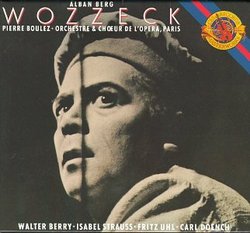| All Artists: Berg, Berry, Paris National Opera, Boulez Title: Wozzeck (Complete) Members Wishing: 1 Total Copies: 0 Label: Sony Release Date: 5/1/1997 Genre: Classical Style: Opera & Classical Vocal Number of Discs: 1 SwapaCD Credits: 1 UPCs: 074643085229, 5099707925124, 509970792512 |
Search - Berg, Berry, Paris National Opera :: Wozzeck (Complete)
 | Berg, Berry, Paris National Opera Wozzeck (Complete) Genre: Classical
|
Larger Image |
CD Details |
CD ReviewsThe second studio recording of Wozzeck - and still the best. Robert Moore | Tampa, FL | 02/26/2000 (5 out of 5 stars) "This is the Wozzeck which must NOT be missed. All the depth and power of Berg's score is laid bare for all to hear in this unparalleled performance from 1966. As if Boulez' strict attention to the score's meaty details and the crystalline recorded sound ain't enough, the extremely powerful performances by Walter Berry and Isabel Strauss definitely bring home the bacon for anybody wishing to hear Wozzeck "as it was meant to be". Act III is a nightmare from which one never wants to awaken. I'm telling ya, if you don't buy this thing, you're gonna hate yourself later." A worthy sucessor to Boulez's Lulu Thomas Plotkin | 11/08/1999 (5 out of 5 stars) "Boulez is is best known for his pioneering Paris Opera production and recording of the completed three act Lulu. This previous recording of Berg's other opera is equally fine, following the music very objectively and carefully. Walter Berry, more familiar from Romantic opera is especially fine: His sprechgesang is expressive and dramatically very effective. To be recommended" Forget your Velvet Underground 9 Inch Nails Sonic Youth Thomas Plotkin | West Hartford CT, United States | 05/21/2008 (5 out of 5 stars) "...or whatever art-rock/noise-punk allows the listener to wallow in dissonant decadent despair. Alban Berg's atonal opera got there first and did it best back in 1924. The story of a hulking "little man," a lowly dogfaced soldier bullied by his superiors, experimented upon by a deranged scientist, cuckolded by his lover, and generally beaten down by life to the point where he can only strike back in an act of futile violence, Wozzeck is Expressionist Verismo at its finest. Berg singlehandedly dragged Europe's gingerbread opera houses into the 20th century, not just by means of his elaborately designed Modernist music, but by depicting history's lumpen victims, the bitten who will one day bite back (true to real life the victims of Berg's victimized protagonists are never the oppressors, revolutions never work...see also Berg's next opera, Lulu).Berg's lush, huge score slithers like an anaconda, its hallucinatory shocks and occasional dreaminess the very sound of a Freudian stream of consciousness. Werner Herzog directed a so-so film version of the Buchner play that is the opera's source, but if Rainer Werner Fassbinder had lived to turn his attention to opera direction, Wozzeck, which has much in common with his beloved Berlin Alexanderplatz, would have been a logical choice and a perfect match.
Conductor Pierre Boulez is the finest interpreter of the Modernist repertoire, and his interpretation eschews Berg's lunges in the direction of Romanticism in favor of bringing out every detail in the music imaginable, at a pace which carries the listener inexorably towards the final catastrophe. While this has shamefully fallen out of print, and Amazon sellers put it out for extortionate prices, if you live near used CD stores, scour the bins, I have encountered this title frequently (easy to imagine someone buying it expecting Strauss, getting the classical equivalent of Sister Ray instead, and out to the yard-sale it goes...) Indispensible." |

 Track Listings (5) - Disc #1
Track Listings (5) - Disc #1